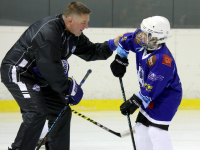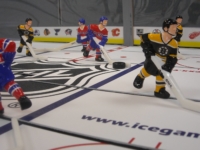What Are We Seeing in Youth Hockey?
The COVID-19 pandemic has been going on for two years now in Canada, and only recently has the hockey community started to get back to normal. Higher vaccination rates have brought with them an easing of restrictions, and although health checks are still in place at the rinks, for the first time in a long time hockey is back. Canada without hockey just feels wrong. While the NHL receives most of the headlines for the sport, we need to remember how much the lockdowns impacted youth sports as well.
For many children, youth hockey is both a social activity and a way to get exercise and maintain fitness. For others, it is a path to attaining a future goal of playing in the NHL or getting a college scholarship to further their education. In one fell swoop, COVID-19 managed to take that away from the Canadian youth, and just because hockey is back it does not mean we can just gloss over the repercussions. As we learn more about mental health in sports and amongst children, it becomes abundantly clear just how devastating the COVID-19 lockdowns really were.
Youth Hockey as a Social Activity
Team sports have always been great for youths as it provides them with a team environment as well as the feeling of inclusion. Of course, hockey is an excellent source of exercise, but we should not overlook its value as a social experience for our children. Team-building and leadership skills can be carried on into nearly every facet of life in the future. Personally, I always look back fondly on my seasons of minor hockey, and still maintain friendships with many of the kids I grew up playing with.
When COVID-19 hit Canada, there was an immediate lockdown on all organized sports. At the time, we probably didn’t realize how detrimental this would be to the mental health of our children. Hockey Canada ran a poll earlier this year in which 45% of hockey parents in Canada replied that the absence of organized team sports during the lockdowns may have an impact on the mental health of their children. This should not be overlooked, and shows just how important having that social outlet is for developing youths.
Youth Hockey as a Source of Fitness
Hey, we all seemed to have gained some weight during the pandemic lockdowns. While it may not be as apparent with our children, the absence of proper exercise is evident during these key developmental years. It has an effect on everything including their health and even their ability to focus and learn in school. We weren’t just missing hockey as a sport, we were missing it as an outlet for excess energy and discipline as well.
Having too much leftover energy can affect sleeping habits in children, which can ultimately affect physical development. Sure, I get that they are sleepy when we wake them up for early morning practices, but just like how we feel refreshed if we go to the gym before work, children are able to focus on their studies after an early morning skate. It also does the obvious things like burning calories, improving strength and the cardiovascular system, as well as benefits coordination and agility.
Losing Development Time
The truth is, children only have so many years to develop as athletes. Their bodies are constantly changing, and as they become busier with school, organized sports unfortunately takes a back seat. The lockdowns hit a group of children just as they were beginning to find their way athletically, and have now missed nearly two years of development time. Dryland training and YouTube videos can only do so much, but if they really want to take hockey seriously, nothing beats on-ice experience and training.
Even if most children do not have aspirations to play in the NHL one day, they still missed a good season or two of skill development. This can have an adverse effect on their on-ice confidence, and have a direct impact on how much they enjoy playing hockey in the future. The lockdowns affected older players too, particularly those who are on the path to playing professionally. The lost season could have potentially pushed them away from hockey, or at the very least, stunted their development and training. Nobody talks about the fact that we may have lost a generation of young hockey players who never returned to the game following the lockdowns.
Be Mindful of Mental Health
But perhaps most of all, the lockdowns ensure that children stay indoors, instead of getting fresh air and exercise. It would have been ideal if they were able to get to the rink, but many kids didn’t even get to play street hockey outside during the pandemic. The mental health of our children is something we should always be mindful of. Being in lockdown and away from organized sports was difficult on everyone. Now that hockey is back, let’s get them excited to go head to the rink for practices and games again!
The odds are your kids will love to return to organized hockey to see their friends again. If they aren’t, it’s definitely worth having a talk with them about why they don’t want to return to the ice. Is it complacency? Laziness? Or perhaps something more? It was a long couple of years for everyone who was affected by the pandemic and its lockdowns, so let’s remember that it has had an effect on our children as well.
Also keep in mind that the pandemic has affected families in other ways as well. We all know hockey isn’t the most affordable sport in the world. For those who may have lost employment during the lockdowns, it’s easy to see why minor hockey fees would be low on the priority list. Now that the rinks are re-opened, we may be witnessing a migration of families and children away from organized hockey, and that is a real shame for an entire generation of future hockey players.






